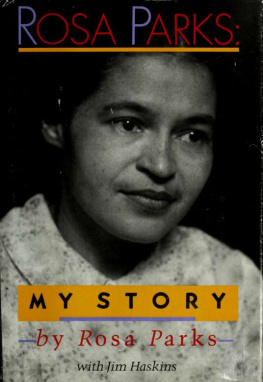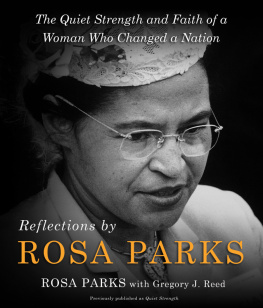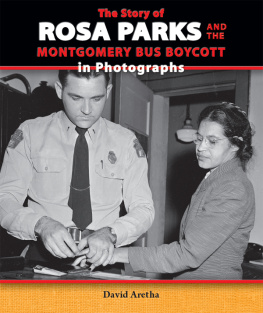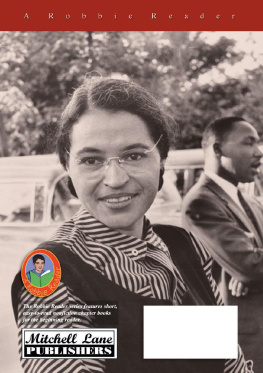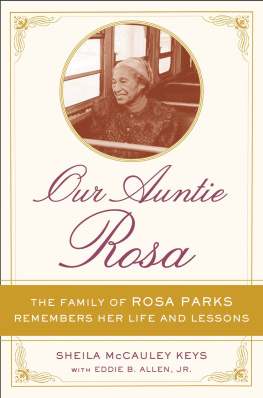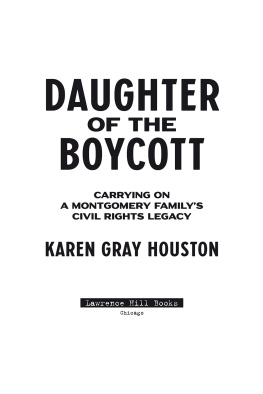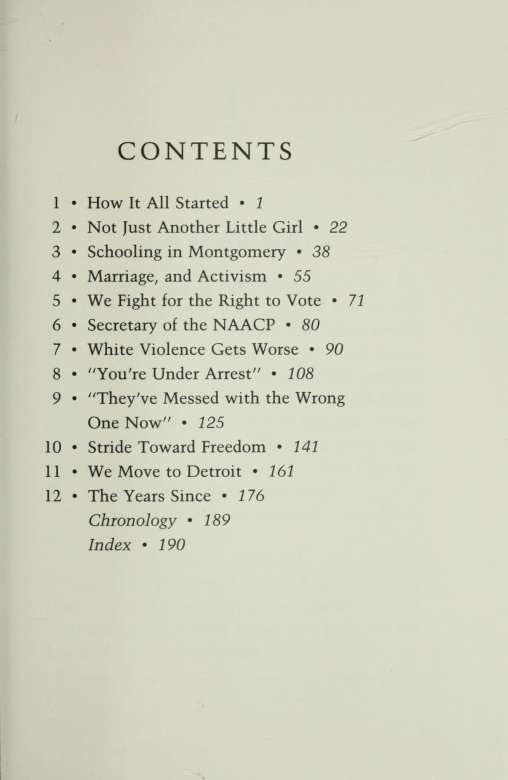This book made available by the Internet Archive.
This book is dedicated to the memory of
my mother, Leona McCauley,
and my husband, Raymond A. Parks.
I am grateful to Elaine Steele, my friend, traveling companion, and Executive Director of
the Rosa and Raymond Parks Institute for Self-Development, for her help with this book.
To Rosa Parks
Whose creative witness was the great force that led to the
modern stride toward freedom
Martin L. King, Jr.
Inscription written by Dr. King on the frontispiece
of his book Stride Toward Freedom, a copy of which
he gave to Rosa Parks.
How It All Started
One evening in early December 1955 I was sitting in the front seat of the colored section of a bus in Montgomery, Alabama. The white people were sitting in the white section. More white people got on, and they filled up all the seats in the white section. When that happened, we black people were supposed to give up our seats to the whites. But I didn't move. The white driver said, "Let me have those front seats." I didn't get up. I was tired of giving in to white people.
"I'm going to have you arrested," the driver said.
"You may do that," I answered.
Two white policemen came. I asked one of them, "Why do you all push us around!"
He answered, "I don't know, but the law is the law and you're under arrest."
Rosa Parks : My Story
For half of my life there were laws and customs in the South that kept African Americans segregated from Caucasians and allowed white people to treat black people without any respect. I never thought this was fair, and from the time I was a child, I tried to protest against disrespectful treatment. But it was very hard to do anything about segregation and racism when white people had the power of the law behind them.
Somehow we had to change the laws. And we had to get enough white people on our side to be able to succeed. I had no idea when I refused to give up my seat on that Montgomery bus that my small action would help put an end to the segregation laws in the South. I only knew that I was tired of being pushed around. I was a regular person, just as good as anybody else. There had been a few times in my life when I had been treated by white people like a regular person, so I knew what that felt like. It was time that other white people started treating me that way.
One of my earliest memories of childhood is hearing my family talk about the remarkable time that a white man treated me like a regular little girl, not a little black girl. It was right after World War I, around 1919. I was five or six years old. Moses Hudson, the owner of the plantation next to our land in Pine Level, Alabama, came out from the city of
How It All Started
Montgomery to visit and stopped by the house. Moses Hudson had his son-in-law with him, a soldier from the North. They stopped in to visit my family. We southerners called all northerners Yankees in those days. The Yankee soldier patted me on the head and said I was such a cute little girl. Later that evening my family talked about how the Yankee soldier had treated me like I was just another little girl, not a little black girl. In those days in the South white people didn't treat little black
Rosa Parks's birthplace in Tuskegee, Alabama. (Courtesy of Rosa Parks)

Rosa Parks : My Story
children the same way as little white children. And old Mose Hudson was very uncomfortable about the way the Yankee soldier treated me. Grandfather said he saw old Mose Hudson's face turn red as a coal of fire. Grandfather laughed and laughed.
I was raised in my grandparents' house in Pine Level, in Montgomery County, near Montgomery, Alabama. All my mother's people came from Pine Level. My mother's name was Leona Edwards. My father
Rosa's mother, Leona Edwards (seated); and Leona's cousin Beatrice. (Courtesy of Rosa Parks)

How It All Started

Rosa's father, fames McCauley, 1923. (Courtesy of Rosa Parks)
came from Abbeville, Alabama. His name was James McCauley. He was a carpenter and a builder, very skilled at brick- and stonemasonry. He traveled all around building houses.
My father's brother-in-law, Reverend Dominick, Aunt Addie's husband, was pastor of the Mount Zion African Methodist Episcopal Church in Pine Level, and it was there in Pine Level that my father met my mother, who was a teacher. They were married right there in Pine Level on April 12, 1912. My mother was twenty-four years old, and my father was the same age.
Rosa Parks : My Story
After they were married, they moved to Tuskegee, Alabama, to live. It was the home of Tuskegee Institute, which Mr. Booker T. Washington had founded back in 1881 as a school for blacks. My parents lived not far from it. Both black and white leaders called the town of Tuskegee a model of good race relations, and that may have been why my father wanted to move there. And there were a lot of building jobs in the county of Macon, Alabama. My mother got a job teaching.
It wasn't long before they started a family. I was born on February 4, 1913, in Tuskegee, and named Rosa after my maternal grandmother, Rose. My mother was around twenty-five years old by the time I was born, but she always said that she was unprepared to be a mother. I guess she was unhappy because my father worked on building homes in different places in the county and she was left alone quite a bit. She had to quit teaching until after I was born, and she always talked about how unhappy she was, being an expectant mother and not knowing many people. At that time women who were pregnant didn't get out and move around and socialize like they do now. They stayed pretty much to themselves. She said she spent a lot of time crying and weeping and wondering what she was going to do and how she was going to get along, because she wasn't used to having a child to take care of.
I came along and I was a sickly child, small for
How It All Started


